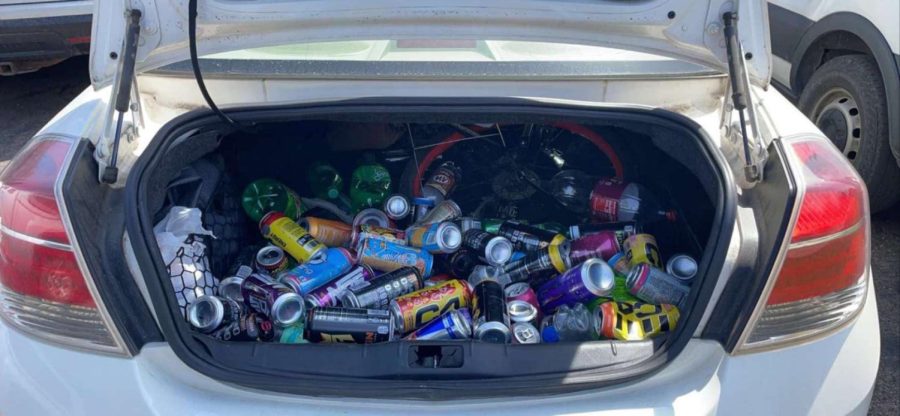Exposing Milford’s caffeine addiction
Senior Noah McGrath’s trunk containing an ever-growing pile of old energy drinks (Photo courtesy of Ryan Hanlin).
May 11, 2022
Between school, homework, sports, part-time jobs and college preparation, most teens live busy lives. With so much to do, teens may turn to highly caffeinated energy drinks to help them stay awake and stay focused. But is all that caffeine good for them? With how regularly available caffeinated drinks are, it is very easy for teens to over-use and depend on drinks like this. Overconsumption can cause a caffeine addiction, which can lead to side effects such as insomnia, restlessness, headaches, anxiety and, in worse cases, heart attack. Without the knowledge to know how addicting these seemingly innocent drinks are, it can be extremely dangerous for teens to consume.
An energy drink is any beverage that typically contains large amounts of caffeine, added sugars and legal stimulants such as guarana, taurine and L-carnitine. After water, sugar is the main ingredient in energy drinks. These legal stimulants can increase alertness, attention and energy as well as increased blood pressure, heart rate and breathing. In the United States, more than 20,000 emergency room visits in 2011 were associated with energy drink use.
With Milford students starting school at 7:21 a.m., many will also only get about 6.5-7.5 hours of sleep per night. This then leaves them feeling worn out and exhausted throughout the day. Many will turn to a quick fix energy drink that they think will give them a boost through the day. As many as 11.6% of schools sell energy drinks in vending machines, school stores and snack bars. Nationwide, 75% of school districts do not have a policy in place regarding the sale of these types of beverages. During an interview with Kevin McKenna, Milford’s principal, he admitted the reasoning for the sale of energy drinks in our school, “The Kickstart drinks follow enough health standards for them to be allowed in the vending machines, however it isn’t up to me what drinks are placed into them. We ultimately have a contract with Pepsi who decides what is put into the machines.”
At Milford High School, there are select energy drinks for sale, such as Mountain Dew Kick Starts in the vending machines and Celsius in the school store. These items are known to sell out quickly. Senior Jack Preston, who works a part time job and runs track for Milford High School said, “during the week, I drink about two each day and four on the weekends, which is 18 every week.” Junior Rhys Porter admits to drinking even higher amounts of caffeine saying, “ On average I drink four to five each day depending on the type of energy drink, and in total I drink about 40 a week.” With the total amount of caffeine he drinks he is estimated to be consuming 900 mg of caffeine a day, and 6100-6300 mg of caffeine a week. According to kidshealth.org experts recommend teens get no more than 100 mg of caffeine a day. Which means Porter consumes 9x the recommended amount each day.
Caffeine addiction is not something that teens should have at such a young age. When looking to quit here are some quick tips. First of all you may think about if it really is worth it to quit, but studies have shown that quitting coffee helps you lower anxiety which can cause stress eating. Quitting can even help lower cortisol in the body which tells your body to store belly fat and it can also help lower blood pressure (Thebeet.com).
Cleveland Clinic recommends when quitting to try for flavored seltzers instead, and other non-caffeinated drinks. Getting enough sleep at night for teens can help distract from the want of caffeine in the morning. The recommended amount of sleep for teens ages 13 to 18 is 8-10 hours a night (cdc.gov). Exercise, and keeping busy can help distract yourself from withdrawal symptoms such as headaches, nausea and irritability. Another key to beating caffeine withdrawal symptoms is water, water, water.
Staying hydrated will energize your body, which may negate the need for caffeine in the first place. Quitting energy drinks can make you feel happier and more awake according to nib.com. Overall buying energy drinks drains your wallet because overtime it adds up. Next time you go to buy one think twice about what you are about to put into your body.
